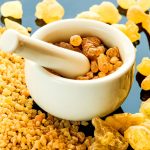Mary Bove, ND
Excerpts from lecture notes for presentation at upcoming Southwest Conference on Botanical Medicine, April 10 – 12, 2015 at SCNM in Tempe, Arizona www.botanicalmedicine.org
Can inflammation and immune dysfunction play a major role in insomnia? Research on the effect of cytokines may provide the answer.
Cytokines are regulatory glycoproteins acting as the intercellular chemical messengers of the immune system. Some cytokines help promote sleep, and some can cause sleep disruption. The specific cytokines which disrupt sleep are stimulated by chronic infection, inflammation, and/or persistent stress. And to add to the bodily insult, long-term lack of sleep increases the risk of obesity, diabetes, and cardiovascular disease, chronic diseases which are all linked to cytokine imbalance.
Botanical therapeutics involve a multi-faceted approach: modulating cytokines, managing neurotransmitters, quenching inflammation, and re-regulating the immune system. That is why a combination of anti-inflammatory herbs, nervines, and adaptogens can have a more successful outcome than the nervine/sedative herbs alone.
The goal is to reduce or eliminate the use of common sleep medications and re-establish the proper cytokine balance. As we know, medications such as benzodiazepines, which are addictive, can cause daytime drowsiness and withdrawal symptoms. The non-benzodiazepines can also cause dependence, although they are less addictive.
Alternatives to sleep medications are tailored to the individual patient. Sleep hygiene, nutrients to support sleep, and botanical therapies are all addressed in this presentation.
Cytokine Modulators:
- The research shows that immunomodulators such as Allium, Echinacea, Panax ginseng, Silybum, Uncaria and Withania can alter immune function through the dynamic regulation of informational molecules such as cytokines, thereby promoting restful sleep.
- Plants with anti-inflammatory actions, such as Curcuma longa, Piper nigrum, green tea, holy basil and devil’s claw, can be combined with adaptogens, immunomodulators and analgesics to modulate cytokines and promote sleep.
- Adaptogens with cytokine-lowering actions include ashwaganda, astragalus, holy basil and maitaki mushroom
- Analgesics, nervines and sedative plants with cytokine lowering actions include fresh milky oats and Jamaican dogwood, combined with one or more soporifics such as passionflower, hops or lemon balm.
Curcumin
Curcumin (found in turmeric) is a very powerful cytokine modulator, it downregulates the expression of various pro-inflammatory cytokines (TNF, IL-1, IL-2, IL-8), likely through inactivation of the transcription factor NF-kB (nuclear factor-kappa B). NF-kB also inhibits the induction of the pro-inflammatory compounds COX-2 and iNOS.
One study in the UK (Clin Cancer Res. 2004;10(20):6847-6854)
indicated that an oral dose of 3.6 grams resulted in plasma concentrations of curcumin of 10 nanomoles/liter, but it could not be detected at lower doses.
Piperine (active constituent of black pepper) appears to have a positive effect on uptake of curcumin, so a combination of the two improves bioavailability of curcumin.
When curcumin is combined with quercetin, resveratrol and piperine, data suggests an improvement in bioavailability of curcumin and resveratrol, compared to supplementation with single compounds.
Additional herbs to consider:
- Devil’s club: Anti-inflammatory and analgesic. 250 – 435 mg daily for pain; 1800 – 2400 mg daily for arthritis, musculoskeletal pain and inflammation. This study indicated a marked reduction in the release of pro-inflammatory cytokines: Fiebich BL, et al. Phytother Res. 2012
- Green tea: Analysis indicates large populations drinking 8 – 10 cups of green tea have lower amounts of pro-inflammatory cytokines ( 2011 February; 27(2): 206–213.) Dosing with ECGC (275 – 300 mg green tea extract in capsules) is thought to have a similar effect. Prevention: 2 – 4 capsules; therapeutic dosing: 4 – 6 capsules
- Holy basil: Ursolic acid contained in holy basil has anti-inflammatory and COX-2 inhibitory actions. Can be taken as a tea (2 -3 c daily), dried powder (250 – 1000 mg per day) or tincture (4 – 10 mls per day).
- Milky oats: inhibits the secretion of pro-inflammatory cytokines. Used in nervous irritation, sleeplessness, nervous exhaustion and weakness.
Herbal combinations for modulating cytokines and sleep patterns:
- Morning to mid-day: Adaptogens and immunomodulators
- Mid-day to evening: Adaptogens, immunomodulators and anti-inflammatory herbs
- Evening to bed: Anti-inflammatories, nervines, sedatives, analgesics
 A clinical medical herbalist, Mary Bove has a practice in family medicine in Brattleboro, Vermont. She is the author of An Encyclopedia of Natural Healing for Children and Infants, and recently produced an iPhone App, Momma Nature’s Food Pharm Guide.
A clinical medical herbalist, Mary Bove has a practice in family medicine in Brattleboro, Vermont. She is the author of An Encyclopedia of Natural Healing for Children and Infants, and recently produced an iPhone App, Momma Nature’s Food Pharm Guide.
This lecture will be presented at the Southwest Conference on Botanical Medicine on April 10 – 12, 2015 at SCNM in Tempe. Information on the full conference program available at www.botanicalmedicine.org
References:
- Sleep Med Clin. 2007 “Chronic Insomnia and Stress” June; 2(2): 279–291.
- Clin Cancer Res. 2004;10(20):6847-6854
- Alternative Medicine Review Volume 13, Number 3 2008
- Nutrition. 2011 February; 27(2): 206–213.
- Head KA and GS Kelly. “Nutrients and botanicals for treatment of stress: adrenal fatigue, neurotransmitter imbalance, anxiety, and restless sleep” Alt. Med. Rev. 2009;14(2): 114-140
- Sleep Med Clin. “Sleep and Cytokines” 2012 Sep; 7(3): 517–527.
- Sleep Med.“Cytokines and pathological Sleep” 2008 Aug;9(6):603-14. Epub 2007 Nov 19.
http://buywithoutprescriptionrxonline.com/fluoxetine.html
http://rxbuywithoutprescriptiononline.org/ventolin.html





